Introduction to Forensic Document Examination
Forensic document examination is a crucial part of forensic science, involving the analysis of documents suspected to be fraudulent or manipulated. Whether it’s verifying a forged signature, determining if a contract has been altered, or uncovering subtle document tampering, forensic document examiners play a pivotal role in uncovering the truth.
In Kenya, the need for forensic document examination has been on the rise, especially with the increase in financial fraud, property disputes, and criminal cases. Whether it’s a court case involving land ownership or a contract dispute, forensic document examiners provide the evidence needed to solve these complex issues.
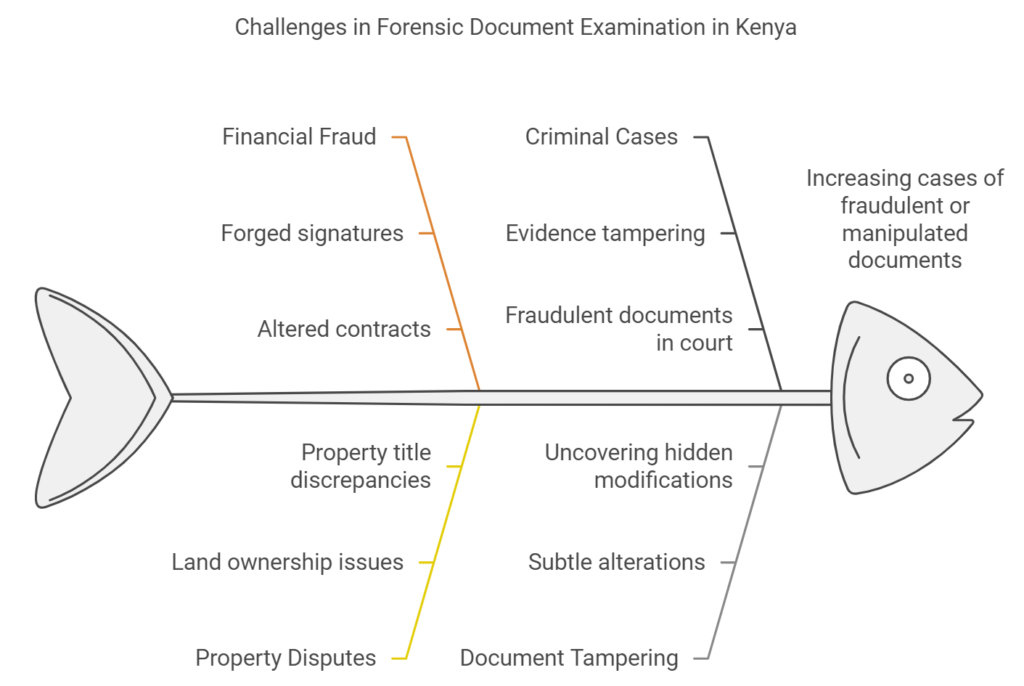
The Role of a Forensic Document Examiner
A forensic document examiner, or FDE, specializes in analyzing questioned documents for authenticity. Their job involves detecting forgery, analyzing handwriting, and even using technology to compare ink or paper compositions. It’s a role that combines meticulous attention to detail with advanced scientific techniques.
To become a forensic document examiner, individuals must have strong analytical skills, a background in forensic science or a related field, and a thorough understanding of the legal system. They must also stay updated with new techniques and technologies to combat the evolving nature of document fraud.
Common Types of Cases Handled by Forensic Document Examiners
Forensic document examiners work on a broad range of cases, including:
- Fraudulent documents: Identifying counterfeit contracts, financial statements, and certificates.
- Forged signatures: Comparing handwriting samples to detect fraudulent signatures on important documents.
- Altered documents: Analyzing erasures, added text, or changed dates on legal documents.
- Questioned handwriting: Determining whether handwriting matches that of an individual in cases of wills, letters, or personal agreements.
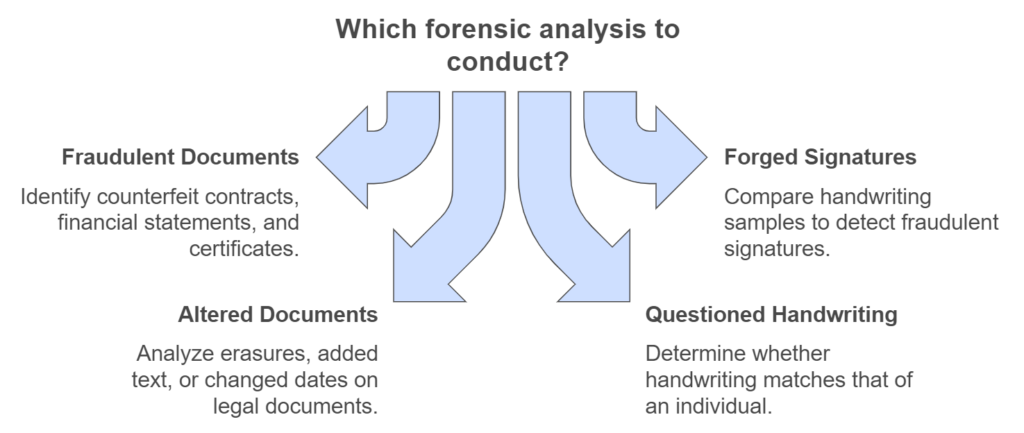
The Forensic Document Examination Process
The process of examining documents follows a structured approach. It begins with:
- Initial consultation and evaluation: The examiner meets with clients, often lawyers, to discuss the case.
- Collection of questioned documents: The suspected documents, along with known samples (exemplars), are gathered for comparison.
- Detailed analysis: Using various techniques like handwriting comparison, ink analysis, and ultraviolet light examination, the examiner scrutinizes the documents for inconsistencies.
- Comparative analysis: Side-by-side comparisons are made with known authentic documents to detect any discrepancies.
- Reporting and court presentation: The findings are compiled into a comprehensive report, which is often presented in court as expert testimony.
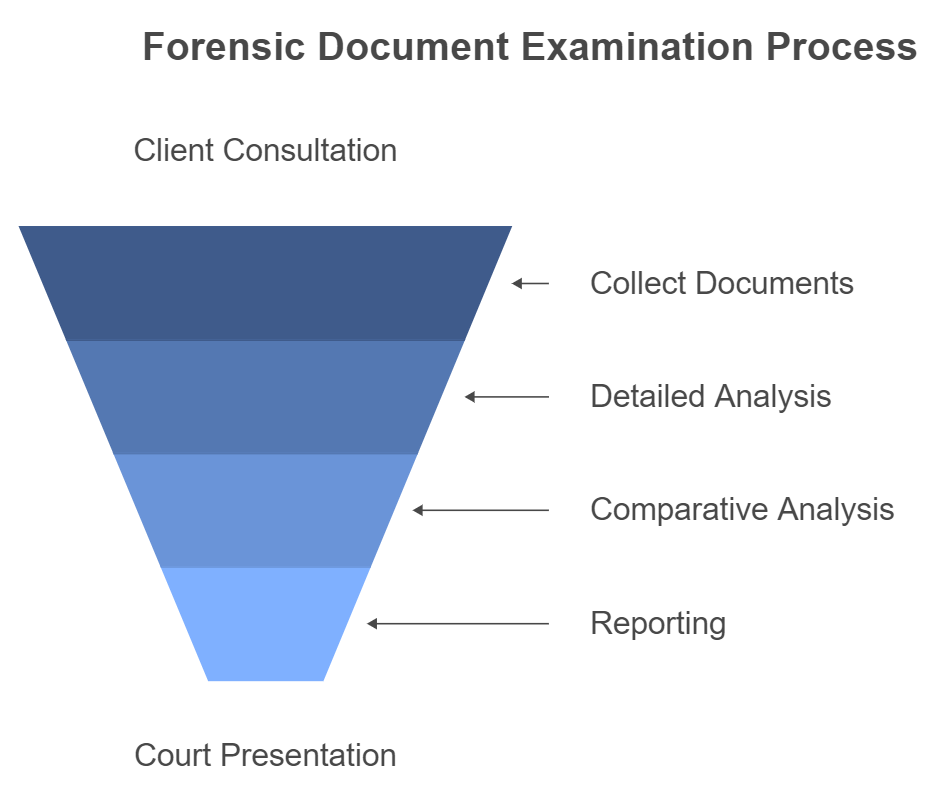
Key Techniques Used in Forensic Document Examination
Several advanced techniques help forensic document examiners uncover the truth:
- Handwriting comparison: Examiners analyze the individual characteristics of a person’s writing to determine authenticity.
- Paper and ink analysis: These techniques involve studying the chemical makeup of inks or the fibers in paper to determine when and where the document was created.
- Alteration detection: With the help of microscopic examination or chemical testing, subtle changes such as erasures or ink overwrites can be detected.
- Digital forensics: As more documents become digitized, examiners use advanced software tools to analyze scanned documents, detecting modifications invisible to the naked eye.
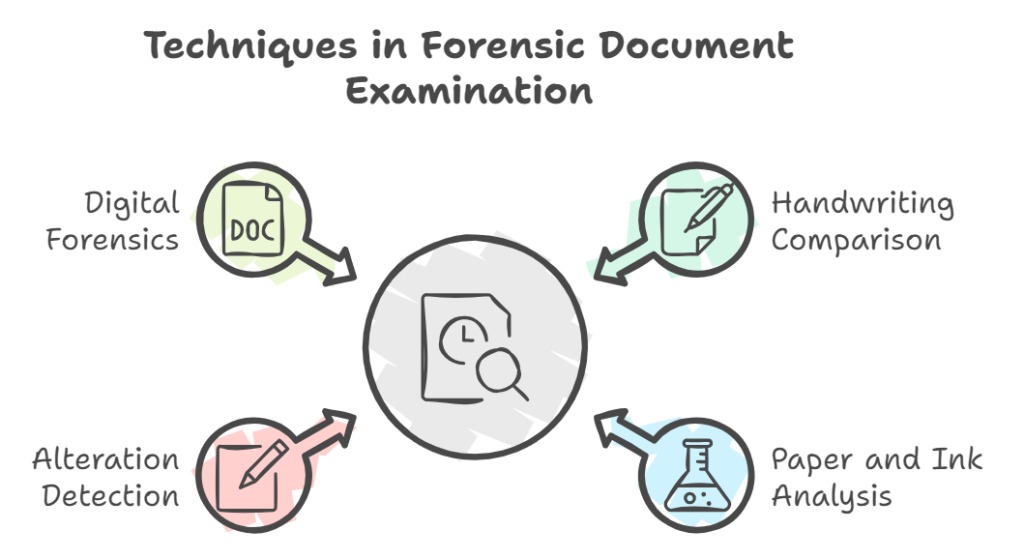
Challenges Faced in Forensic Document Examination
Examiners face various challenges, such as detecting highly sophisticated forgeries. With fraudsters using cutting-edge technology, examiners must continually update their skills and tools. Moreover, the pressure of presenting findings in a court of law requires utmost precision and confidence in their analysis.
Forensic Document Examination in Kenya
In Kenya, forensic document examination is playing an increasingly important role. Cases involving land ownership, financial fraud, and criminal activities often hinge on the authenticity of critical documents. Kenyan courts now rely more heavily on forensic examiners to provide the expertise needed to resolve disputes.
However, the field faces challenges unique to the country, including limited resources and increasing sophistication in document forgery.
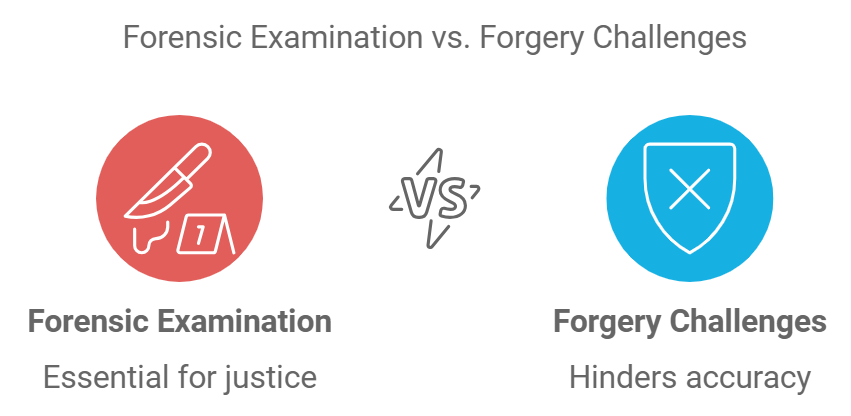
Forensic Document Examiners in Legal Cases
In Kenya, forensic document examiners play a crucial role in both criminal and civil cases. In criminal cases, they may help to establish the authenticity of evidence such as written confessions, while in civil disputes, they are often called upon to verify contracts, wills, or property deeds. Their expert testimony can be the key factor that sways the outcome of a case.
Why Choose a Professional Forensic Document Examiner?
Accuracy is paramount in forensic document examination. A reliable examiner brings years of experience, specialized skills, and credibility, ensuring their findings are legally admissible. In Kenya, where forgery and document fraud are common, having a professional examiner on your side can make all the difference.

How to Identify a Reliable Forensic Document Examiner in Kenya
When selecting a forensic document examiner, consider the following:
- Certification and qualifications: Ensure they have relevant academic qualifications and certifications in forensic science.
- Proven track record: Experience handling similar cases, especially in the Kenyan legal context, is invaluable.
Ultimate Forensic Consultants: Kenya’s Leading Forensic Document Experts
If you’re in need of forensic document examination services in Kenya, Ultimate Forensic Consultants is the go-to agency. They offer a range of services, from signature verification to document alteration analysis, and have a proven track record of success. With a team of experienced examiners, Ultimate Forensic Consultants has been pivotal in resolving numerous legal cases across the country.
The Legal Impact of a Forensic Document Examiner’s Report
A well-documented forensic report can significantly influence court decisions. As expert witnesses, forensic document examiners like those from Ultimate Forensic Consultants provide compelling testimony that can clarify the most complex document-related disputes.
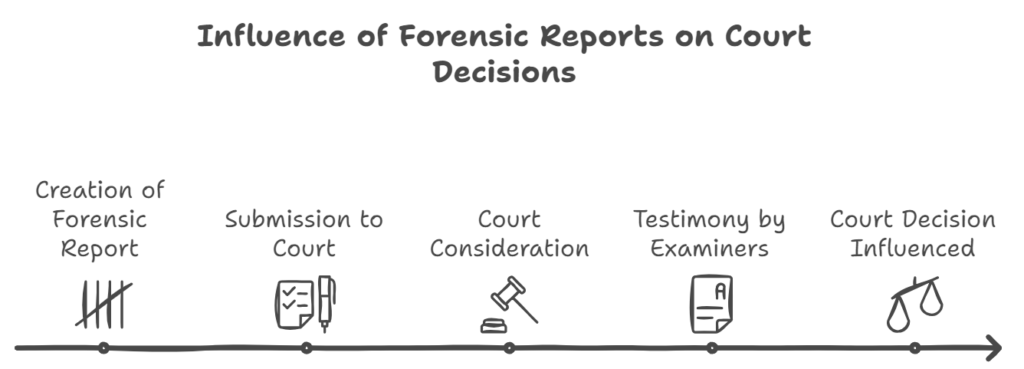
The Cost of Forensic Document Examination in Kenya
Costs vary depending on the complexity of the case and the number of documents to be examined. However, investing in a professional forensic document examiner can save significant legal costs in the long run by providing irrefutable evidence that can resolve a case more quickly.
Real-Life Case Studies: Forensic Document Examination in Kenya
Kenya has witnessed several high-profile cases where forensic document examiners played a crucial role. From land ownership disputes to forged financial documents, these experts have helped bring justice by uncovering the truth hidden in fraudulent paperwork.
Conclusion
In Kenya, forensic document examiners are vital to the justice system, providing clarity in cases where truth and authenticity are in question. As the demand for their expertise grows, it’s crucial to work with trusted professionals. Ultimate Forensic Consultants, with their experience and dedication to detail, are the leading experts in the country, offering the peace of mind that comes with knowing the truth will be uncovered.
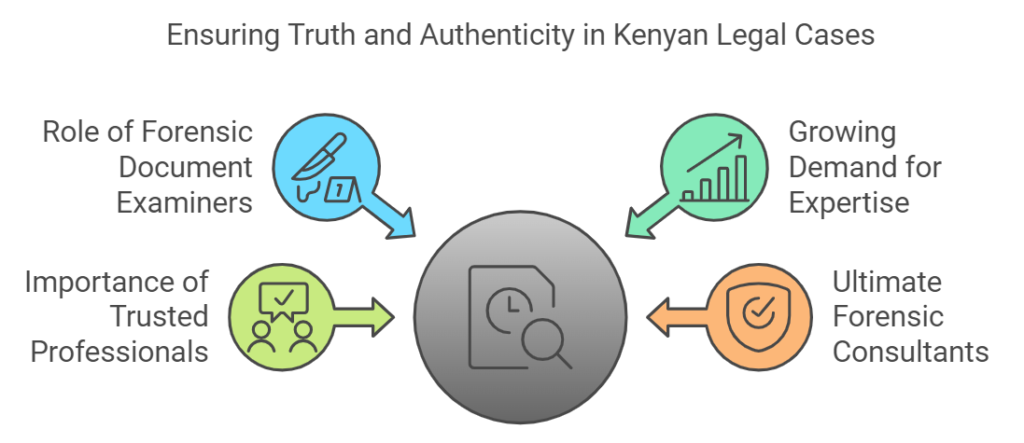
FAQs
- What qualifications should a forensic document examiner have? A forensic document examiner should have a background in forensic science, experience in legal cases, and relevant certifications.
- How long does a forensic document examination take? It varies, but most cases can take anywhere from a few days to several weeks, depending on complexity.
- Can a forensic document examiner prove a signature is forged? Yes, through handwriting analysis and comparison, they can determine if a signature is genuine or forged.
- What types of documents can be examined? Forensic document examiners can analyze contracts, legal documents, financial records, handwritten notes, and more.
- How much does it cost to hire a forensic document examiner in Kenya? Costs vary, but most professionals charge based on the complexity of the case and the number of documents involved.
